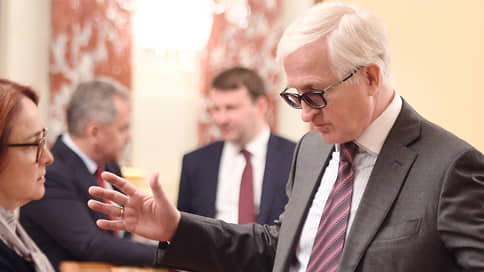Offers you can refuse
[ad_1]

The Russian Union of Industrialists and Entrepreneurs (RSPP) sent proposals to the Bank of Russia and the Ministry of Finance on the development of the financial market under sanctions. Formally, the document is a response to the construction proposed earlier by the Central Bank, which suggests that the financial sector does not need state support, but liberalization and technologization of markets. The RSPP, on the other hand, is expected to support the idea of stimulating banks to finance economic development and is counting on more extensive relaxations for the financial sector.
In continuation of the discussion about sources of support for the economy and involvement of the financial market in economic development projects, the RSPP sent a “programme document” to the Central Bank and the Ministry of Finance on a possible structure for the development of the financial market in the new conditions. Formally, this is a response to the Bank of Russia’s report “Financial Market: New Challenges in Modern Conditions”, published in August, which describes the regulator’s views on a possible scheme for the operation of financial markets in the changed conditions due to the start of the Russian military operation in Ukraine. The document, we recall, covers a wide range of topics: from market transparency and information disclosure requirements to the future of foreign exchange regulation. The Central Bank focuses on maintaining anti-Russian sanctions, discouraging the use of “toxic” currencies and the need for a development model based on domestic investment. At the same time, it is assumed that the financial sector is able to independently restore financial stability in the medium term (see Kommersant of August 5).
The RSPP conceptually agrees with the position of the regulator, while the main proposals of the union concern the stabilization of the ruble exchange rate by abandoning the “toxic” currencies of unfriendly countries, stimulating settlements in “friendly” currencies, as well as the accelerated development of digital financial assets and the deployment of preferential lending programs for promising industries with an emphasis on import substitution.
Incentives for financial market participants to support priority investment projects should, in the opinion of the RSPP, be accompanied by deregulation on a larger scale in comparison with the proposed design of the Central Bank. In particular, while the Central Bank notes the temporary nature of regulatory easing due to the accumulation of financial stability risks, the RSPP is counting on the elimination of all excessive regulatory requirements. Meanwhile, the document looks contradictory: the requirement to revise the requirements in the financial sector (AML / CFT, FATCA, IFRS reporting, Basel standards) is accompanied by the thesis about the need for high-quality consolidated reporting in accordance with international standards to increase the attractiveness of the market for investors.
Such a spread of proposals can be explained by the direct consolidation by the profile committee of the RSPP of all the initiatives received. Although the document follows the structure of the Central Bank’s report, it also contains non-core proposals – for example, on social support. At the same time, some of the proposed initiatives look doubtful (like the idea of the Central Bank repurchasing the Russian state debt, including for financing strategic investment projects), some can be taken into account by the regulator when the Bank of Russia develops the draft “Guidelines for the development of the financial market for 2023 and the period of 2024 and 2025” . Along with supporting large investment projects, the RSPP insists on financing small businesses, including through the development of regional banks. The document describes in some detail the mechanisms for attracting private investors to the market – we are talking about tax incentives for owners of securities of Russian state-owned companies, bank deposits in systemically important banks. Another set of RSPP proposals involves the introduction of risk-based regulatory incentives – a rating system for investment projects to evenly distribute credit risk within the financial system.
In general, the RSPP is counting on a closer dialogue with the regulator when setting up measures to support the financial market. For this, it is proposed to create a specialized working group, which will both develop proposals and monitor the effectiveness of the measures taken to support the financial market. It should be noted that changes in the work of the market due to the military operation have already required a transformation of work in the RSPP itself – for example, in the spring a working group was created there to improve currency regulation and international settlement mechanisms.
[ad_2]
Source link






